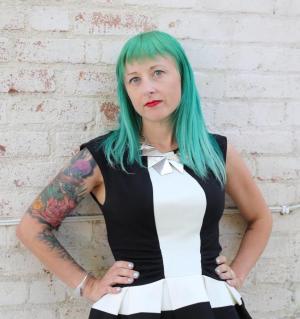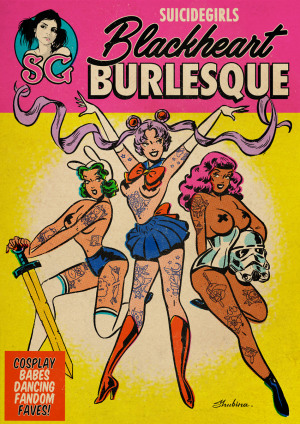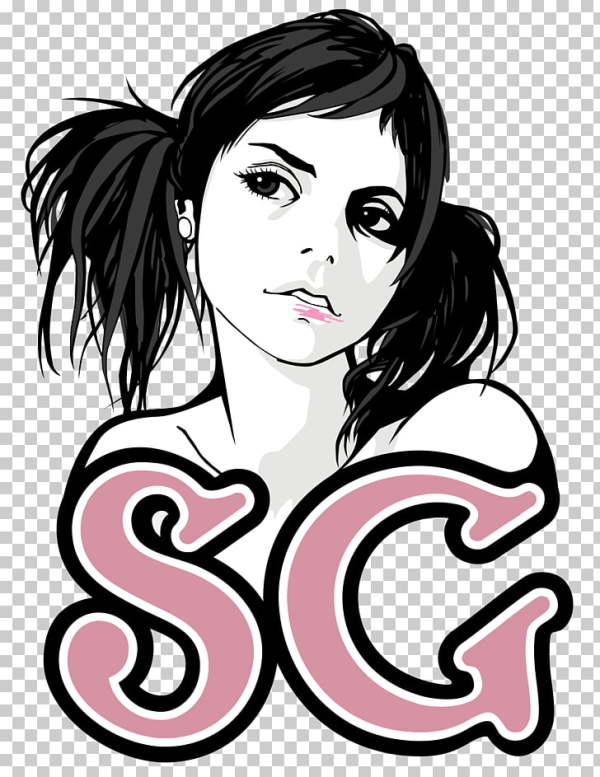 BY LARA MICKLE In 2001 Selena Mooney quit her job as director of technology for Ticketmaster and moved back to Portland and ingratiated herself in the city’s thriving punk rock/stripper scene. She started with a handful of ladies and now has thousands globally. Inspired by Bunny Yeager — who famously photographed Bettie Page, the patron saint of the punk rock stripper scene — she began taking retro-style pin-up photos of her friends, most of them tattooed, pierced and dyed blue, green or purple.
BY LARA MICKLE In 2001 Selena Mooney quit her job as director of technology for Ticketmaster and moved back to Portland and ingratiated herself in the city’s thriving punk rock/stripper scene. She started with a handful of ladies and now has thousands globally. Inspired by Bunny Yeager — who famously photographed Bettie Page, the patron saint of the punk rock stripper scene — she began taking retro-style pin-up photos of her friends, most of them tattooed, pierced and dyed blue, green or purple.
The SuicideGirl look is some ratioed combination of sultry, vintage and riot grrrl. It was the Internet that made them visible to the naked eye of the heretofore blinkered mainstream, forever exploding the media-ascribed hetero-normative barbie-doll beauty standard of the preceding century. They didn’t give a damn about a bad reputation, they embraced all that society had deemed as transgressive and disqualifying adding an element of danger and rebellion to previously agreed upon notions of female desirability. The overwhelmingly positive response Mooney got from sharing the photos online got her to thinking: maybe this could be a thing.
Borrowing a provocative epithet from Chuck Palahniuk’s 1999 novel Survivor, she started referring to her models as ‘suicide girls,’ changed her name Missy Suicide and launched a subscription web site featuring her photos. Behold the SuicideGirls brand was born and soon to be blowing up on an Internet near you. Fast-forward 18 years and a lot of tattoo ink and purple Manic Panic under the bridge, and the SuicideGirls’ Blackheart Burlesque is coming to Underground Arts on Saturday October, 5th. Recently, we got Missy Suicide on the horn to discuss all the aforementioned and the ever after.
PHAWKER: How did SuicideGirls get started? Why do you think it took off?
MISSY SUICIDE: Well, I started SuicideGirls because I believed, at the time, the greatest power of the internet was bringing people together and creating community and you know this was a time before Friendster or Myspace or Facebook or Twitter and so it was kind of an unproved theory at the time. We were one of the first social networks. I feel like over the past 18 years I’ve been proved very right. People want to share their lives. At the time it was a whole different world.
PHAWKER: This was long before social media really took off?
MISSY SUICIDE: Yeah, it’s been 18 years. Which is crazy; the girls born after Tuesday [September 3rd, 2001], because Tuesday is the anniversary, will have not known a world without SuicideGirls. Like they will be eligible to model for SuicideGirls and they will have not known a world that existed before SuicideGirls.
PHAWKER: Why did you call it SuicideGirls?
MISSY SUICIDE: It’s a Palahniuk reference, he wrote Fight Club, and in his book Survivor he describes the girls living at Pioneer Square in Portland as ‘suicide girls.’ It seemed like a good moniker. [It was] the girls that were willing to commit social suicide by choosing not to fit in. You know, it was also 18 years ago, it was very… much more conservative I feel like, than we are today so it was much more of a rebellious act to declare that you felt comfortable with your body and that you thought that you were beautiful. Now with Lizzo and the Dove campaign there are so many advocates of accepting the skin that you’re in and just feeling beautiful being who you are. But, back in the day, even just saying that you loved your body was quite a revolutionary sort of thing to say.
PHAWKER: What is the criterion for becoming a SuicideGirl?
MISSY SUICIDE: You just have to be confident and comfortable with your body and yourself. There’s no real formula for girls with X number of tattoos and Y color of hair. We’ve got girls who have tons of face tattoos, we’ve got girls who have no tattoos. We’ve got girls who have 28 piercings and girls with zero piercings. We’ve got girls with Vitiligo and girls with different bodies. They’re all accepted as long as they feel confident and comfortable with their bodies and with themselves. But really, the only requirement is that you feel comfortable enough to share your bare breasts and bottom.
PHAWKER: Is it a full-time job? If so, how much can you make in a year?
MISSY SUICIDE: It is not a full-time job. You’re paid per photo set, but girls can also get tips now. It’s not something that I suggest that you make your full-time job. Girls can leverage their social media and start to gain followings and become influencers, but I see it as a side hustle, not a full-time gig.
PHAWKER: How has #MeToo changed the game both for sex workers and women in general?
MISSY SUICIDE: I feel like the #MeToo movement made people believe what women are saying, that in itself is such a revolution. That women can just tell what is happening to them and people believe it now, as opposed to before when people were like “Oh whatever” or dismiss it, they’re really taken seriously now, and I feel like that is super important.
PHAWKER: Did you see Once Upon a Time in Hollywood? If so, what did you think?
MISSY SUICIDE: I saw it in the Cinerama Dome, and the air conditioning was broken. So, it was like two hours and forty minutes of sitting in a hot packed theater, so I feel like I need to watch it again because I was not in the best place.
PHAWKER: What do you make of the criticism that Tarantino is a misogynist and gave Sharon Tate/ Margot Robbie short shrift?
MISSY SUICIDE: Just to be objective about it, she’s not really the main character in it, it’s kind of like his fantasy world about these other characters. It is a buddy picture at its core. He explores the relationship between the men that you don’t usually see. I felt like it was a really honest deep dive into male interpersonal links, in the sixties too, which was not exactly the touchy feely sort of guys moment. Not every movie has to be about women, if that was not his main goal.
SUICIDEGIRLS BLACKHEART BURLESQUE @ UNDERGROUND ARTS OCT. 5TH

